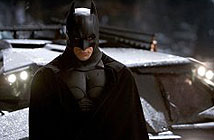|
|
|
|
Batman
Begins
|
 |
|
In the middle of a particularly thrilling action set-piece in Batman Begins, you might find yourself wondering – after you have enjoyed the carnage that the Caped Crusader has inflicted on Gotham's road system and other sundry civic property – just how many innocent, underpaid cops has our hero just massacred? It is hardly surprising that, in the following scene, the script makes sure that the all-knowing butler, Alfred (Michael Caine), says to Bruce Wayne (Christian Bale): "It's a wonder no one got killed!" That little manoeuvre sums up the way Batman Begins works: it constantly plays with the fire of illicit fantasy, but always manages to get the story back on the tracks of ethical rationality. This is no mean feat for a contemporary Hollywood blockbuster. This clever instalment in the Batman series is vastly superior to Joel Schumacher's previous two offerings (Batman Forever [1995] with Val Kilmer and Batman and Robin [1997] with George Clooney). But, in taking this hero's story back to its beginnings, director Christopher Nolan (Memento, 2001) and writer David S. Goyer (the Blade trilogy) avoid the excessive appeal to the Dark Side that Tim Burton brought to Batman (1989) and Batman Returns (1992). Batman is a special case in pop culture's store of superheroes, in that he is a relatively normal guy equipped with ingenious gadgets rather than someone blessed with supernatural powers like Superman or Spider-Man. The tale of Batman's origins, therefore, has to be the story of one man's fervent adoption of a righteous principle, rather than the chronicle of a discovery of divine destiny, or an incidental transformation of human into superhuman. Nolan deals well with the consequence that any Batman story – and especially this one – has to have at least one foot in the realm of logical reality. We have to understand, at least a little, where the gadgets come from and how they work. We have to learn why the bat iconography was chosen and what it means. And, above all, we have to see Bruce Wayne's struggle in coming to accept his lawman role, without the baroque distractions (familiar from other Batman narratives) of imposters, engineered personality switches, or a raft of adult neuroses (repression, frustration, disenchantment). What psychology there is in Batman Begins relates solely to the matter of what Bruce most fears as a result of a childhood incident. Ducard (Liam Neeson) begins to teach him how to face this fear in the course of a Kill Bill-style Oriental fight training. Bruce later uses this lesson when he devises his look and weaponry with the aid of Lucius (Morgan Freeman). In a neat variation, an extravagant fear-complex is also at the heart of the first major crime wave that Batman combats. Unlike Sam Raimi's Spider-Man films, the Batman franchise has problems breaking out of its predominantly masculine milieu. Scenes of banter between Bale and Caine or Freeman have more life and naturalness than the strained romance element between Bruce and the bloodless, do-gooder lawyer, Rachel (Katie Holmes). When it comes to the crunch, she becomes, on cue, the screaming victim who needs to be saved by the intrepid hero. Superhero movies, despite their enormous box office success, tend to comprise the most ephemeral and superficial part of pop culture. As screen fantasies, they manage to escape, more successfully than any other genre, the pressing problems of contemporary life. Marrying a skin-deep engagement with classical myths to dazzling special-effects technology, they are made to be consumed and instantly forgotten. It is asking too much of Nolan and Goyer to transcend that inherent limitation of the Batman series. But, within the rules of the game, they have managed to make a smart, fast, satisfyingly focussed entertainment. MORE superheroes: Elektra, Daredevil, Catwoman, Hellboy © Adrian Martin June 2005 |
![]()